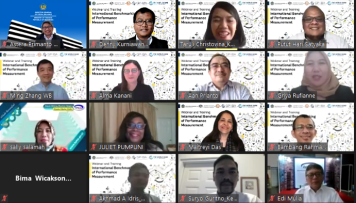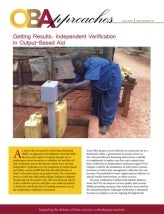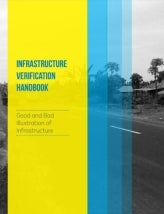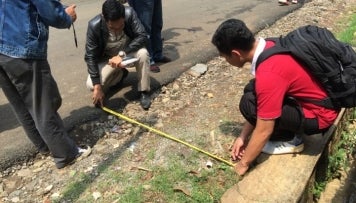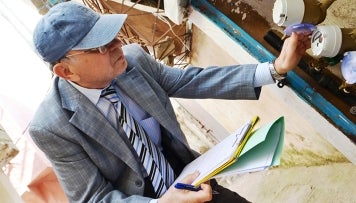
Photo: GPRBA
As interest increases in using
results-based financing (RBF) approaches, shifting the focus from inputs to outputs through the use of performance-based incentives or subsidies, the need for reliable verification systems has become more important. Independent verification is a key component of output-based aid (OBA), a form of RBF that links the disbursement of funds to the achievement of specified results. The independent verification process built into the OBA project design, helps to integrate monitoring and quality control into the project cycle and triggers subsidy disbursement.
In an OBA project, service delivery is contracted out to a third party, either a government or private sector entity, who assumes a portion of the project risk by providing pre-financing and then receives a subsidy to complement or replace user fees once outputs (such as solar home systems or connection of households to water supply systems) have been verified by an independent verification agent (IVA).
Because verification is linked with subsidy disbursement, the IVA can improve service quality and accountability, providing assurance to donors and governments that their funds have been used for the intended purpose. Although verification is ultimately focused on outputs, it is ongoing throughout the project cycle, so that shortcomings or obstacles can be identified and corrective actions based on the feedback are put in place before final verification.
The IVA can be an audit firm, an NGO or civil society representative, a qualified individual consultant, or a government agency. The appropriate choice depends on the project and country context. We have gathered examples and useful resources on the methodologies and procedures (techniques) used by IVA’s in different types of RBF approaches covering projects supported by GPOBA, World Bank and other partners. The list is not intended to be comprehensive but meant to serve as reference and example.
Getting Results: Independent Verification in Output-Based Aid
This
note discusses the verification process used by the OBA approach and presents projects in Indonesia and Kenya as examples to show how they are making innovative use of the verification mechanism.
Supporting Independent Verification in Indonesia
GPOBA’s technical assistance
support to the Government of Indonesia has trained internal auditors to become IVAs to increase the government’s ability to verify outputs in investment projects. This project became GPOBA’s
Inn-OBA-tions award recipient in 2016. Check out a related
blog and a
verification Handbook.
IVAs Working to Prepare OBA Sanitation Projects in Nairobi
In this
project the role of IVAs was expanded to include critical baseline data collection that informed project and made tracking progress toward indicators and outcomes during project implementation easier.
Using technology to improve the cost-efficiency of results verification in Program-for-Results Financing (PforR) projects
A project funded through the World Bank's
Program-for-Results, a financing instrument which is a form of RBF linking disbursement to specific program results, incorporated
mobile data collection in the verification process. This technology allowed for real time data collection and the capacity to access information and visualize where verification was taking place, and the ability to quickly catch errors before they became systematic.
Read more...
What have we learned about Payment by Results (PBR) programmes from verifying one?
This
article written by the team verifying and evaluating DFID’s Water, Sanitation & Hygiene (WASH) program shares emerging findings from the evaluation team, highlighting lessons learned by the Suppliers, and sharing its suggestions for how to design future PBR programmes.
Developing effective M&E systems under Payment by Results programming
This
paper discusses in detail the monitoring, verification and evaluation framework of the South Asia WASH project under DFID’s PBR Program.
Verification in results-based financing for health
This
study looks at verification processes and practices to address the design and implementation needs of RBF projects in the health sector based on case studies from six countries: Afghanistan, Argentina, Burundi, Panama, Rwanda, and the UK.
Blog on Indonesia: A Local Perspective on Independent Verification that discusses Indonesia's success in building capacity in local governments and communities to perform their own independent verifications.
Read more...


